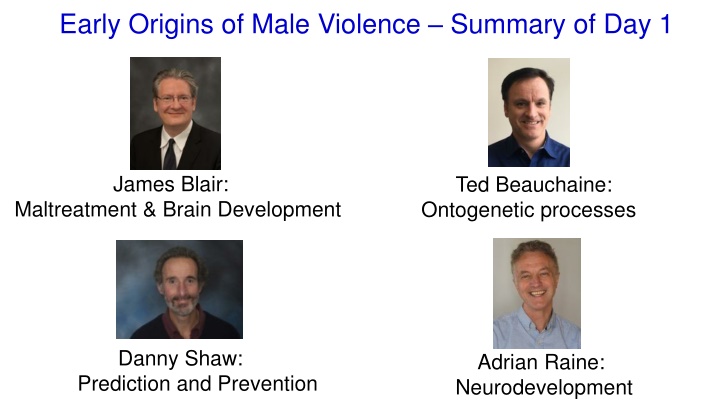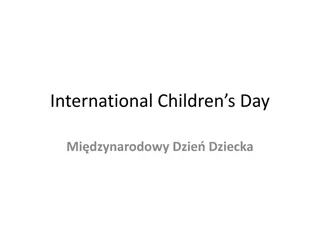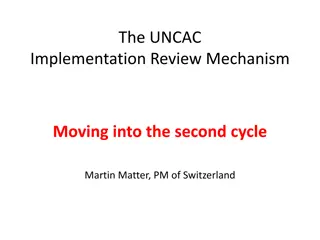
Male Violence Origins: Neurodevelopmental Insights and Prevention Strategies
Explore the early origins of male violence through neurodevelopmental perspectives and prevention strategies discussed by experts in the field. Discover findings from studies on maltreatment, brain development, and predictors of antisocial behavior from early childhood to adolescence. Gain insights into interventions like the Family Check-Up aiming to address conduct problems in children and support parental involvement.
Download Presentation

Please find below an Image/Link to download the presentation.
The content on the website is provided AS IS for your information and personal use only. It may not be sold, licensed, or shared on other websites without obtaining consent from the author. If you encounter any issues during the download, it is possible that the publisher has removed the file from their server.
You are allowed to download the files provided on this website for personal or commercial use, subject to the condition that they are used lawfully. All files are the property of their respective owners.
The content on the website is provided AS IS for your information and personal use only. It may not be sold, licensed, or shared on other websites without obtaining consent from the author.
E N D
Presentation Transcript
Early Origins of Male Violence Summary of Day 1 James Blair: Ted Beauchaine: Ontogenetic processes Maltreatment & Brain Development Danny Shaw: Prediction and Prevention Adrian Raine: Neurodevelopment
James Blair: Maltreatment & Brain Development 1. Different forms of aggression: different neural mechanisms, different treatment? 2. Striatum: enlargement and reward-seeking? 3. Empathy impairments: sex differences 4. Testosterone, aggression and context
Ted Beauchaine: Ontogenetic processes 1. Neurodevelopmental model beginning with ADHD 2. Delayed maturation hypothesis: Could this explain striatal enlargement in adulthood? But what about reduced prefrontal grey? 3. Are we waiting too long before we intervene?
Primary Findings from Pitt Mother & Child Project Primary Findings from Pitt Mother & Child Project Observed parenting quality, maternal depression, and other family stressors before age 3 are best predictors of persistent trajectories of antisocial behavior from ages 2 - 17. Beginning at ages 2-3, child issues with emotion regulation, oppositional and aggressive behavior, also consistent predictors of adolescent and young adult antisocial behavior. Adolescent violent behavior best predicted by income, minority status, parenting, and child emotion regulation and conduct problems before age 3. Results suggest targeting these behaviors in early childhood that are more malleable than others: parenting, parent-well being and family stress, child emotion regulation and oppositional/aggressive behavior.
The Family Check-Up represents an effort to develop a model-driven preventive intervention during a critical developmental transition The ESP help fill the chasm between basic and applied research by using a vehicle (FCU) to motivate parents to become more interested in their children s early conduct problems and factors associated with their persistence These are families who typically do not use community mental health services 2 to 12 year follow-up data from the ES Pilot and Multi-Site studies encouraging, but Clear that only a minority of children screened on the basis of risk for early-starting CP responded to FCU and that other contextual factors attenuate effects We MUST! But how? Targeted subgroup or everyone? Summary and Next Steps: Implementations where and with whom? More than half do not benefit
Danny Shaw: Prediction and Prevention 1. Changing the lightbulb: want to change to motivated to change 2. Aggression comes before ADHD 3. Improvements mediated by improved parenting / depression at age 2-3
Yours Truly: My Parting Shot 1. Brain Imaging Research: Bad brain, bad behavior 2. Basic Neuroscience Finding: Omega-3 is critical for brain structure and function 3. Experimental Clinical Neuroscience Finding: Omega-3 reduces aggression 4. Clinical Implication: Consider omega-3 supplementation to reduce aggression
The Audience 1. What about basic needs of impoverished families? 2. How will new neuroscience insights inform intervention? 3. Roles of bipolar disorder and depression





















